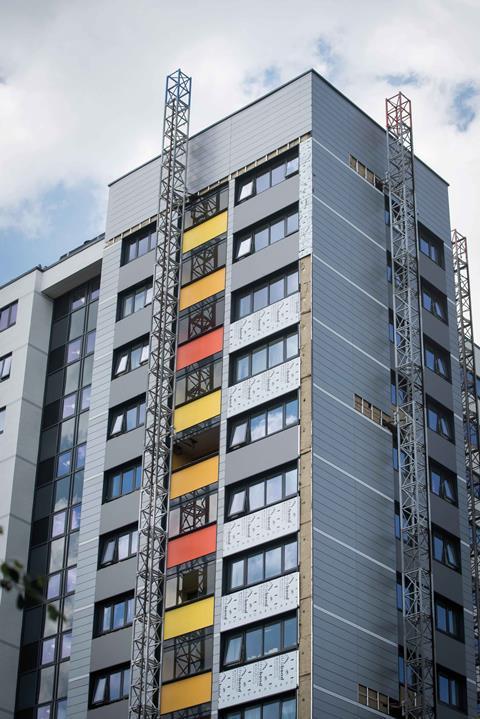HBF says £2bn tax must take account of ’hundreds of millions’ spent by developers already on fire safety works
Major housebuilders have called on the government to ensure that housebuilders that have already spent tens of millions repairing homes with unsafe cladding aren’t forced to effectively ‘pay twice’ through the proposed £2bn developer tax.
Trade association the Home Builders Federation said in a statement that the industry accepted it needed to contribute to the huge remediation costs of high rise buildings now considered to be unsafe. However, it said the proposed cladding tax had to take account of the “hundreds of millions of pounds” already spent by the UK’s largest builders on the problem.
The call by the HBF comes after UK’s largest housebuilder, Barratt, yesterday became the latest to expose the extent of the cost of repairing “legacy” blocks deemed unsafe in the wake of the Grenfell Tower fire, saying it had now allocated £163m to fix problems.

The call comes after the Treasury launched a consultation on the design of the so-called Residential Property Developer Tax (RPDT) last week in which it proposed that all developers with profits from residential development activity in the UK of more that £25m should be caught by its new levy.
While the details have not yet been finalised – and the Treasury gave no indication of the rate at which it proposed to set the levy – there was nothing in the consultation to indicate that developers that have already spent money on repairs will see that recognised in their tax bill.
The HBF estimates that more than £500m has been committed by major housebuilders to repair blocks caught up in the crisis, with both Taylor Wimpey and Bellway having also contributed more than £100m each, and Persimmon having set aside £75m.
The HBF also said the tax could impact the industry’s ability to build new homes, and called for the government to ensure that other parts of the construction industry that contributed to the crisis – including manufacturers, contractors, architects and insurers, shared the burden of remediation costs.
The government’s consultation said it intended that only profits on UK residential development, as opposed to money made from building and contracting or other construction-related services, will be taxed.
An HBF spokesperson said: “The industry accepts that it has a part to play in funding remedial works, but a new tax should be fair and proportionate and considered alongside other future tax rises such that it doesn’t threaten housing supply or investment in zero carbon homes and new technology.
The spokespserson said: “A new tax on some housebuilders […] should take into account the hundreds of millions of pounds set aside or paid out by housebuilders already”, adding that while the industry was recovering from the covid-19 pandemic, “an overly onerous regulatory burden and tax regime would threaten investment by industry and levels of supply.
“Beyond the proposal for the new tax, consideration should be given as to how the supply chain, including manufacturers, contractors, architects and other consultants, together with their insurers, share the burden of remediation.”
>> Jenrick’s new developer levies are no easy answer to the cladding crisis
Based on pre-pandemic levels of profitability and a profit threshold of £25m for levying the tax, at least 30 major developers are on course to be hit by it when it is brought in from 2022.
The Treasury last week said it will set the rate of the tax so as to ensure it did not have a “disproportionate” impact on housing supply, but nevertheless accepted that the tax “may result in a reduced number of plots viable for development, with a subsequent impact on [new housing] completions”.
The decision to bring in the new tax was announced in February alongside a £5bn spending package designed to help residents in the tallest blocks, which was criticised by campaigners as falling far short of the estimated £15bn nationwide repair bill.
The government said the cladding tax is being designed to raise £2bn to contribute to the costs over a 10-year period.
The crisis has seen thousands of buyers of new homes left stranded in unsafe properties which they are unable to sell facing repair bills of tens of thousands of pounds. The government last week forced through legislation making leaseholders potentially responsible for the cost of cladding repairs, despite a backbench rebellion by Conservative MPs to attempt to get it to change course.
In addition to the developer tax, the government is proposing a separate levy – called the “Gateway 2 Levy” – to be paid by the developers of new high-rise buildings upon receipt of planning permission.
The Treasury said last week that the housing ministry will consult separately on that levy “in due course”.











1 Readers' comment